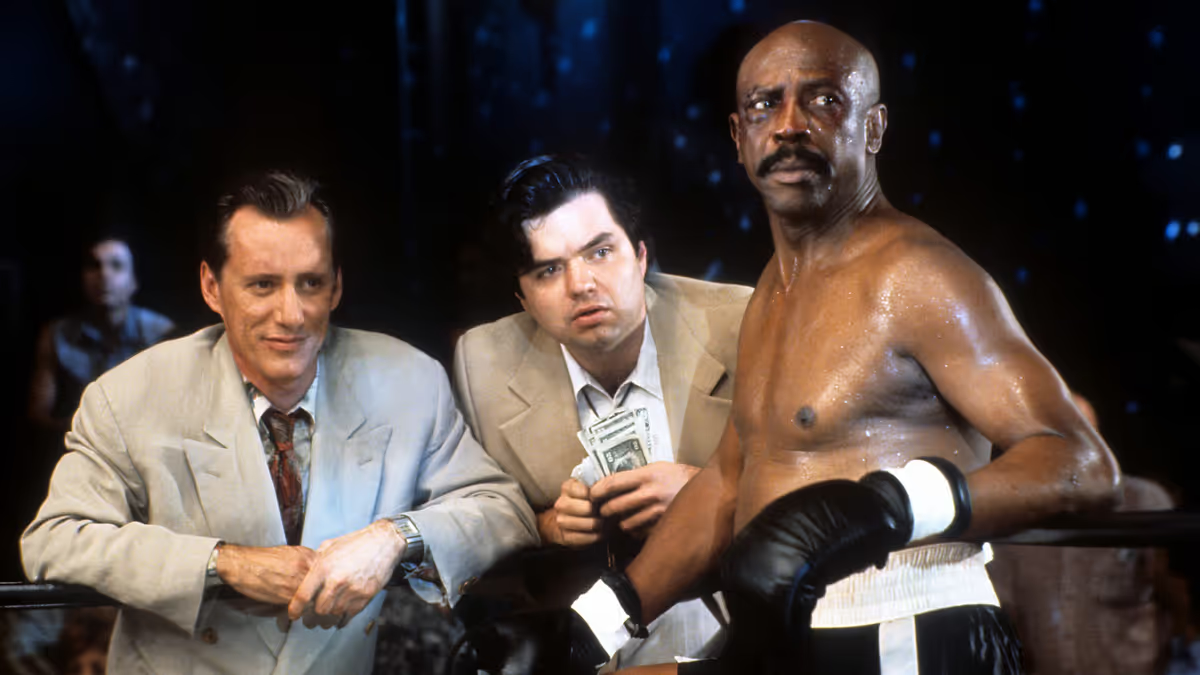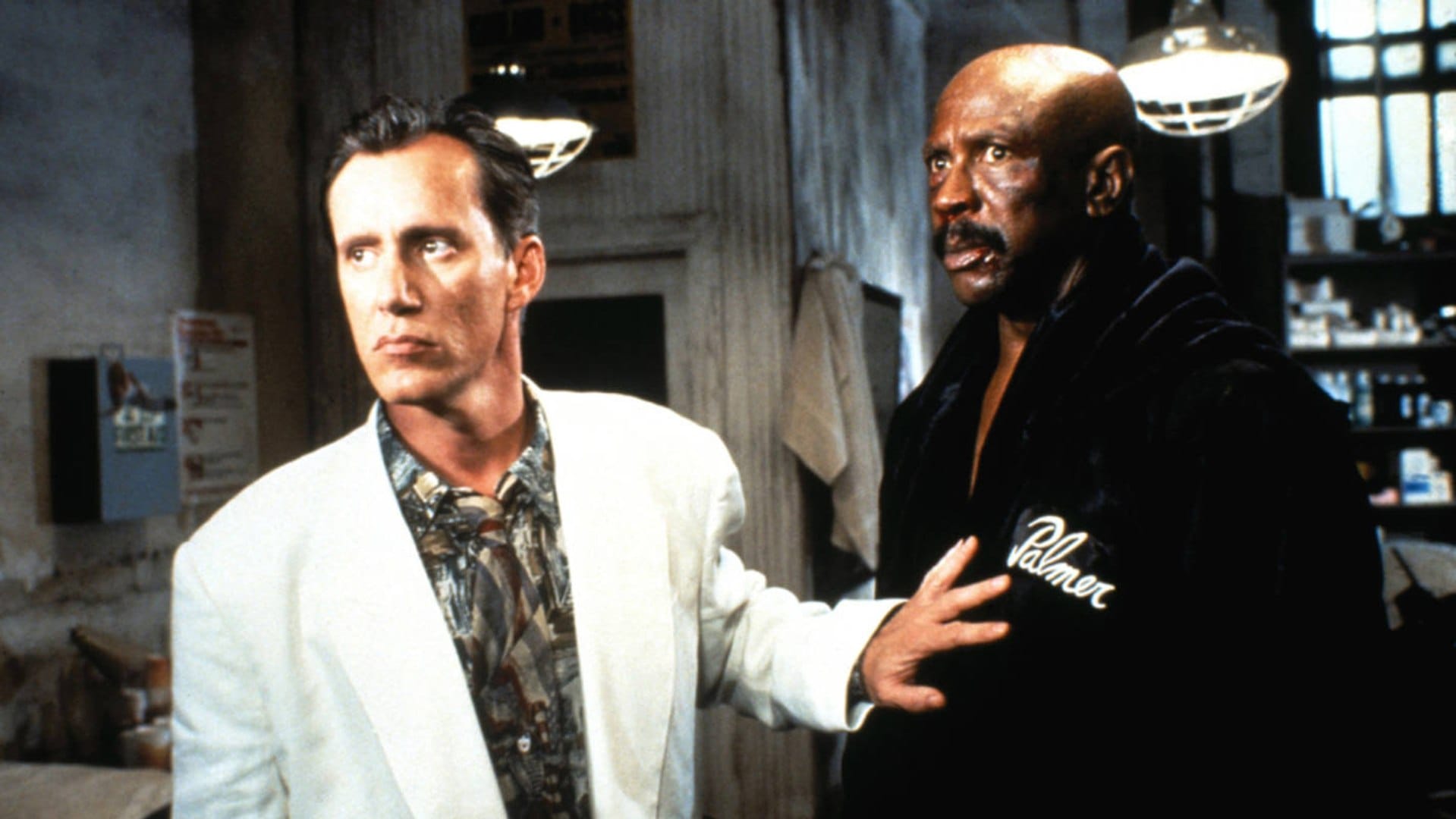Cheat to Win: The Underdog Scoundrels of 'Diggstown'
With the death last week of Louis Gossett Jr.'s, now's a good time to remember one of the less-celebrated gems in his seven-decade career.

Louis Gossett Jr. died last week at age 87. The obituaries led, naturally, with his role as Gunnery Sergeant Emil Foley in 1982’s An Officer and a Gentleman, for which he became the first Black winner of a Best Supporting Actor Oscar, but his filmography runs deep, along with his early stage work on Broadway and his appearances on television, from an Emmy-winning turn on Roots to his performance as Will Reeves, the first masked vigilante, in the 2019 reimagining of Watchmen. All told, Gossett was in the business for seven decades, and gave many acclaimed performances in many beloved films. But only one of those films was something I recommended dozens of times to a certain type of dude wandering into my video store in Georgia in the mid-‘90s, looking for a brisk entertainment on a Friday night. It was a recommendation with a 100% success rate: the 1992 sports comedy Diggstown.
Released to middling reviews and anemic returns, Diggstown seemed to gain momentum on video and television as an unpretentious pugilistic entertainment like The Sting, a twisty affair with ace con men working to scheme each other out of a fortune. But that “momentum” could be strictly anecdotal on my part, a cult limited to a small handful of appreciators in Athens who half-watched it while dubbing $5 pornography rentals on their second VCR. Yet it’s pleasant to think about the film as a scrappy comeback for everyone involved, including its director Michael Ritchie, who’d been in a steep decline since his ‘70s heyday, and character actors like Gossett, who’d had hits in the mid-‘80s with Enemy Mine and Iron Eagle, but had squandered the years afterwards on Iron Eagle sequels and dogs like The Principal and The Punisher. It’s the type of film that encourages rooting interests.
Depending on which decade you look at, Ritchie could be considered either one of the greatest studio filmmakers of his time or one of the worst. His run from his 1969 debut feature, Downhill Racer, through the mid-1970s could stand toe-to-toe with prime Hal Ashby in its low-key, funny, sideways glance at American culture and politics, particularly the back-to-back-to-back classics The Candidate, Smile, and The Bad News Bears. The ‘80s started with Ritchie backing away from credit for co-directing and producing Student Bodies and got worse from there, with Fletch as the only winner in a streak that included The Golden Child, The Couch Trip, and Fletch Lives. Diggstown only paused his reputational slide a little before the ‘90s furthered that trajectory—Cops & Robbersons, anyone?—but Ritchie’s sure-handedness, particularly his sense of place and character, are a big part of the film’s appeal.

Based on Leonard Wise’s novel The Diggstown Ringers, Diggstown has the basic texture of a noir story, but a tone that’s generally more buoyant and playful, save for one dramatic misstep that I’ll get to later. Still at the peak of his career, before his persona on- and off-screen drifted into the grotesque, James Woods stars as Caine, a con artist who’s sympathetic mainly because he cons other men far sleazier than he is. That starts with the warden at Winfield Prison in Georgia, who’s quite certain (and correct) that Caine has made a lucrative small business out of sneaking inmates out of the clink, but can’t prove it. Joining the battery of first-rate character actors in the cast, Oliver Platt plays Caine’s partner-in-crime, who starts making noise in Diggstown, a place so crazy for boxing that it was named after Charles Macom Diggs, a former heavyweight contender.
There’s not much in this rural outpost, but what’s there belongs to John Gillon (Bruce Dern), a thuggish businessman and hustler who owns the town’s boxing arena and most of the surrounding area. (He’s like Ben Gazzara in Road House, basically.) Caine’s cellmate tipped him to Gillon’s hidden ocean of assets and Caine happens to know just the man to help him pry that money away: “Honey” Roy Palmer (Gossett), a former heavyweight whose short career was distinguished by his ability to knock out other fighters. But Palmer is now 49 and crotchety, limited to teaching lessons at a Ft. Worth YMCA, which makes Caine’s pitch to Gillon extra-tantalizing: Gillon can recruit 10 local boxers to fight Palmer over a single day, and if Palmer doesn’t knock them all out in that stretch, Gillion wins the bet.
That’s a fine hook for a bet and even finer hook for a movie, but Diggstown is only incidentally about an aging boxer gutting out an improbable triumph in the ring. It is more accurately about the art of the hustle, with two top-level sleazebags scheming behind the scenes to rig the event in their favor. Technicalities are skirted, like what constitutes Diggstown residency or whether a fight is forfeited if a boxer doesn’t actually enter the ring. Shenanigans are pulled, like Caine’s guys slipping a “brown bottle” to an opponent that makes him too gassy to take any punches from Palmer. Gillon coaches his early fighters to pound on specific parts of Palmer’s body, so by the time he brings in a couple of ringers down the stretch, the old man will have two swollen eyes and a midsection tenderized like a cut of prime beef under the mallet.
The beauty of Diggstown is there’s really no rational reason to root for anyone other than “Honey” Roy Palmer, who’s the guy actually absorbing all this abuse for a big score. Even at the time, before his real-life heel turn, Woods specialized in playing shady characters who could occasionally show nobility, like his burnout defense attorney in True Believer, but more often flashed a much darker charisma. In Diggstown, he’s at best a lovable rascal, so temperamentally inclined to hustle people that he can’t be blamed for it, even by a supposed friend like Palmer, who merely shakes his head when Caine plays him like a fiddle. But you take it on faith that he’s fair with his partners and Gillon is such a magnificent scoundrel that Caine can only look like a hero for taking his money. When Dern smiles, he has a little twinkle in his eye that here turns breathtakingly malevolent, as if the money doesn’t matter as much as exacting as much harm on his adversary as possible.

To that end, the film makes one major tonal misstep in ramping up the stakes between these two men. After Caine slips $5,000 to two Black brothers to throw their bouts against Palmer, the younger one does such a lousy acting job that it’s obvious to everyone in the room that he’s on the take. That leads an enraged Gillon to put a noose around the kid’s neck as a way of coercing his older brother to try to knock out Palmer or return to find his sibling hung in the locker room. For as much as Diggstown plays with noir elements and escalates this showdown at its center, it’s mostly a comic lark, in no way capable of processing an honest-to-goodness lynching in Act Two. The surviving brother gets to throw the last punch to Gillon’s chin at the end, but the film miscalculates in believing that comeuppance evens out the scales.
The odd shame of it is that Diggstown is otherwise about as sure-handed an audience-pleaser as it gets, carefully setting its own deft little con in the lead-up to an immensely satisfying payoff. Woods, Dern, Platt, and Gossett are all given a lot of real estate to develop their characters and Ritchie turns this godforsaken hick town in Georgia into a memorably seedy fiefdom for Gillon to steal from the locals while commanding their fealty. Movie justice cannot come to a man like that from behind a badge, even if he didn’t have the police on his payroll. It has to come through a trio of con artists who have the cleverness and bravado to hand him a loss on his home court.
Diggstown puts an asterisk on the expression “cheaters never win.” When the cheaters are artists, they do.




Discussion